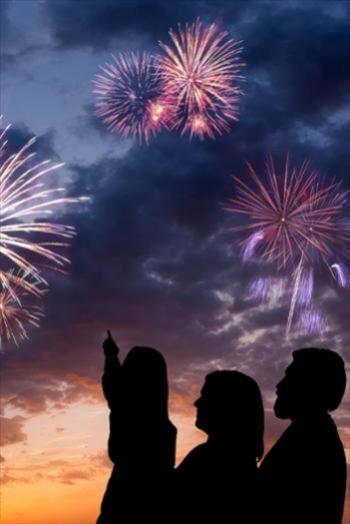New Year
Duration/age

A new year is traditionally a time for celebration. Different cultures have their own ways to celebrate but most see the end of one year and the start of another as a special time. Children enjoy the celebrations and parties along with everyone else. Many people celebrate New Year’s Eve on December 31st with parties. Lunar New Year is celebrated by many Asian cultures and the date and way it is celebrated can vary.
Talking about the new year is an opportunity to explore how different cultures and families will celebrate the end of the year and the beginning of a new year. Talk with your child about how you will celebrate the new year and what needs to be done to get ready.
Will you celebrate with your family at home? Will you go to a local community event where there might be fireworks, music and entertainment? Do you and your neighbours celebrate together at a street party? Will you cook special food that is only served once a year? Is the food the same for all cultures? Are some foods lucky? Will they bring good fortune for the year ahead?
Talk with your child about what you will need to do to get ready and what will happen at the event.
Your child may not be able to stay up until midnight to celebrate but you can do it earlier. Maybe you could change the clock so that they can count down to ‘midnight’. You could have a special new year’s party just for your child.
Materials you will need
- Party hats
- Noisemakers
- Clock
Skills this activity improves
Why does this matter?
Preparing for the celebration of a new year enables children to explore the concept of time and the planning that is associated with time. When talking about how you will celebrate the new year you will be looking at the concepts of day, week, month and year.
What does this lead to?
As you explore what preparation needs to be done for the new year you will be helping your child understand that time is a form of measurement and that it can be represented through language and visual displays such as clocks and calendars. By discussing time, children will learn that time helps us to organise our lives and informs us of the order to do things in.
Language to use
- Old, new
- Midnight, count down
- Party, celebrate, noise, fireworks, loud, music, cheering
- Happy New Year
- Before, after
- First, next, last,
- Five, four, three, two, one!
- Preparation, planning, organising
- Good luck, lucky
- Cleaning, shopping, cooking, decorating
Questions to use
- How will we celebrate the new year?
- Who will celebrate with us?
- What do we need to buy?
- How many days till the new year?
- When is midnight?
- What will happen at midnight?
- How long till midnight?
Useful tips
- Prepare your child before the night by explaining that there will be lots of loud noises.
- You might also like to take a look at the Calendars activity.
- Remember to talk to your child in your home language.
More ideas
- Many people like to make sure their house is extra clean so it is ready for the new year. Your children can help to get the house ready.
- Make a family time capsule or memory box to reflect the year that has happened.
- Mark the date of the new year on a calendar.
- Google information on how different cultures and families will celebrate the new year.
Variation by age
Three to five year olds
- Create a dress up box for the evening.
- Make a 'birthday cake' for the new year. Talk with your child about how you could represent the number of the new year on the cake.
- Make a countdown chart. This could be 12 balloons filled with confetti that you pop for each hour as midnight approaches.
- Make musical instruments to play, shake and bang at midnight.
- Go on a hunt for objects that can make lots of noise at midnight such as saucepan lids.
- Make a list of the special food that you will prepare. Talk about why it is special and the way it will be served.
Questions to ask
- What do you want to wear for the party?
- What will we put on the cake to represent the new year?
- What number will we start at to countdown to the new year?
- What will make the loudest noise?


